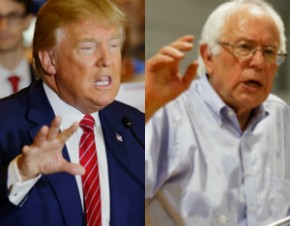Outliers

It is intriguing that the Republican presidential candidate who’s leading the polls and the Democratic candidate who’s close to tying the front-runner are both outliers. Malcolm Gladwell, author of Outliers, defines the word as “something that is situated away from or classed differently from a main or related body.” Outlier Donald Trump is as dismissive of other Republican candidates as he is of Hillary Clinton; he had to be pressured to state that he would not run against his own party. Bernie Sanders, a socialist, is more to the left than party-line Democrats. Both seem to be running against their own parties.
What’s going on? Perhaps the candidates are simply expressions of American individualism, something that’s been both our strength and also our vulnerability from the earliest days of the Republic. In his new book, The Quartet: Orchestrating the Second American Revolution, 1783–1789, Joseph Ellis chronicles how the first Americans weren’t sure they wanted to be part of a national entity. People identified instead with the colony, or later the state, in which they lived. When asked their nationality, most responded that they were Pennsylvanian, Virginian, or from New York. The loose confederation of colonies that declared and won its independence from Great Britain was made up of separate, sovereign states that resisted anything that looked or felt like a unified national entity.
Read our latest issue or browse back issues.
During the Revolution, state legislatures routinely refused to raise recruits for George Washington’s army or to pay for it. Washington repeatedly had to beg the states to pay their assessments to support the Revolution.
Ellis reminded me that the issue of states versus nation is not resolved but very much with us. We see what he means when a Texas U.S. senator suggests that U.S. Army military exercises are a prelude to a full-scale federal invasion of Texas. What Ellis calls “the Second American Revolution” to unite separate states into one nation is still under way.
I believe the tension is a product of the radical individualism deep in the nation’s soul. In popular culture, we hear it in Frank Sinatra’s “I Did It My Way,” an example of hubris, self-centeredness, and contrariness that illustrates radical individualism.
Pastors see the influence of individualism at weddings and funerals, where traditional rites of the church have been abandoned. Couples insist on designing their own wedding ceremonies and writing their own vows, and families of the deceased insist that the occasion Presbyterians call a Service of Witness to the Resurrection must be a celebration of the deceased’s life, so that the gathered assembly can chuckle at what a deadly putter old Joe was when he finally got to the green. The shift away from the community and its traditions and practices leaves us with an emphasis on the individual.
In our congregations, we can talk about the cultural power of individualism and embrace and lift up those practices that endorse community. I’m thankful to God for the church, where we are reminded regularly that we are not only individuals created and loved by God, but we become fully ourselves only in relationship, in community.
As for our country, we’re electing a president for all of us, not merely for the angry, shrill fringe. When our two parties, ideologically different, have also been broad and inclusive, they have served us well. My hope is that those voices with a sense of the entire diverse nation—economically, racially, religiously, and geographically—will be raised and heard.







